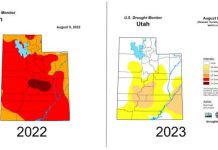
Dec. 13 (UPI) — New maps reveal the scope of the challenge facing wilderness conservationists.
As the new maps show, wilderness around the globe is shrinking — increasingly hemmed in as forests are converted to farmland and development encroaches.
Scientists with the Wildlife Conservation Society compiled the maps with the hope that they can assist the work of wildlife managers and conservationists around the world. Researchers published the maps this week in the journal Nature.
“Despite their importance, wilderness areas are being destroyed at an alarming rate and need urgent protection with almost 10 percent being lost since the early 1990s,” James Allan, a doctoral student at Queensland University in Australia, said in a news release. “Their conservation is a global priority.”
Wilderness offers refuge to plant and animal biodiversity and serves as a buffer against the ecological impacts of climate change and other manmade threats.
“These ecosystems play a key role in regulating local climates, sequestering and storing large amounts of carbon and supporting many of the world’s most culturally diverse — but politically and economically marginalized — communities,” Allan said.
The largest remaining regions of wilderness are found in South America, Africa, Australia and the Arctic regions of North America and Eurasia. A substantial pocket of wilderness is also spread across the Tibetan Plateau.
On the maps, green marks the remaining wilderness, while pink reveals wilderness that has been lost since 1993.
Researchers say governments must do more to ensure wilderness doesn’t continue to shrink.
“Environmental policy almost completely ignored wilderness conservation but this has to change,” said Queensland professor James Watson. “National governments and multilateral environmental agreements such as the World Heritage convention need to step up and protect wilderness before it is too late.”





